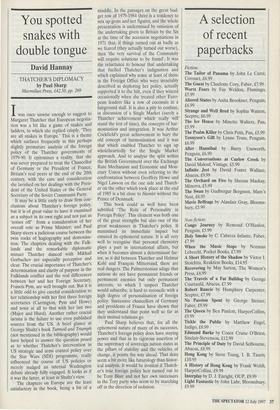You spotted snakes with double tongue
David Hannay
THATCHER'S DIPLOMACY by Paul Sharp Macmillan Press, £42.50, pp. 269 Iwas once unwise enough to suggest to Margaret Thatcher that European negotia- tion was a bit like a game of snakes and ladders, to which she replied crisply, 'They are all snakes in Europe.' This is a theme which surfaces frequently in this perhaps slightly premature analysis of the foreign policy of the Thatcher governments of 1979-90. It epitomises a reality, that she was never prepared to treat the Chancellor of Germany or the President of France, Britain's real peers at the end of the 20th century, with the care and consideration she lavished on her dealings with the Presi- dent of the United States or the General Secretary of the Soviet Communist Party.
It may be a little early to draw firm con- clusions about Thatcher's foreign policy, but it is of great value to have it examined as a subject in its own right and not just as `noises off' from a consideration of her overall role as Prime Minister; and Paul Sharp steers a judicious course between the twin rocks of hagiography and demonisa- tion. The chapters dealing with the Falk- lands and the remarkable diplomatic minuet Thatcher danced with Mikhail Gorbachev are especially perceptive and clear. The crucial importance of Thatcher's determination and clarity of purpose in the Falklands conflict and the real differences between her and her Foreign Secretary, Francis Pym, are well brought out. But it is a little odd to give careful consideration to her relationship with her first three foreign secretaries (Carrington, Pym and Howe) and none at all to that with her last two (Major and Hurd). Another rather crucial lacuna is the failure to use even published sources from the US. A brief glance at George Shultz's book Turmoil and Triumph (not mentioned in the bibliography) would have helped to answer the question posed as to whether Thatcher's intervention in US strategic and arms control policy over the Star Wars (SDI) programme, really influenced the course of US policies or merely nudged an internal Washington debate already fully engaged. It looks as if it was the latter, at least in Shultz's view.
The chapters on Europe are the least satisfactory in the book, being a bit of a muddle. In the passages on the great bud- get row of 1979-1984 there is a tendency to mix up gross and net figures, and the whole presentation is undermined by omission of the undertaking given to Britain by the Six at the time of the accession negotiations in 1971 that, if things turned out as badly as we feared (they actually turned out worse), then 'the very survival of the Community will require solutions to be found'. It was the reluctance to honour that undertaking that fuelled Thatcher's indignation and which explained why some at least of those in the Foreign Office who were invariably described as deploring her policy, actually supported it to the hilt, even if they winced occasionally when she treated other Euro- pean leaders like a row of coconuts in a fairground stall. It is also a pity to confuse, in discussion of a Single Market (surely a Thatcher achievement which really will stand the test of time), the concepts of har- monisation and integration. It was Arthur Cockfield's great achievement to bury the old concept of harmonisation and it was that which enabled Thatcher to sign up wholeheartedly for the Single Market approach. And to analyse the split within the British Government over the Exchange Rate Mechanism and Economic and Mon- etary Union without even referring to the confrontation between Geoffrey Howe and Nigel Lawson on the one side and Thatch- er on the other which took place at the end of 1985 is a bit close to Hamlet without the Prince of Denmark.
This book could as well have been subtitled 'The Role of Personality in Foreign Policy'. This element was both one of the great strengths but also one of the great weaknesses in Thatcher's policy. It maximised its immediate impact but ensured its ephemeral nature. It is all very well to recognise that personal chemistry plays a part in international affairs, but when it becomes almost a determinant fac- tor, as it did between Thatcher and Helmut Kohl and Francois Mitterrand, there are real dangers. The Palmerstonian adage that nations do not have permanent friends or permanent enemies but only permanent interests, to which I suspect Thatcher would subscribe, is hard to reconcile with a high degree of personalisation of foreign policy. Successive chancellors of Germany and presidents of France have shown that they understand that point well so far as their mutual relations go.
Paul Sharp believes that, for all the ephemeral nature of many of its successes, Thatcher's foreign policy does have staying power and that in its vigorous assertion of the supremacy of sovereign nation states as the pillars of stability and the vehicles of change, it points the way ahead. That does seem a bit more like futurology than histor- ical analysis. It would be ironical if Thatch- er's true foreign policy heir turned out to be Tony Blair and not her own successors in the Tory party who seem to be marching off in the direction of isolation.


























































 Previous page
Previous page